- Home
- Gayle Forman
Just One Day jod-1 Page 3
Just One Day jod-1 Read online
Page 3
“Aren’t you Miss Sassy-pants this morning.”
“Here.” Willem reaches into his backpack for a small white container and shakes out a few white balls into Melanie’s hand. “Put these under your tongue to dissolve. You’ll feel better soon.”
“What is this?” she asks suspiciously.
“It’s herbal.”
“Are you sure it’s not some date-rape drug?”
“Right. Because he wants you to pass out in the middle of the train,” I say.
Willem shows the label to Melanie. “My mother is a naturopathic doctor. She uses these for headaches. I don’t think to rape me.”
“Hey, my father is a doctor too,” I say. Though the opposite of naturopathic. He’s a pulmonologist, Western medicine all the way.
Melanie eyes the pills for a second before finally popping them under her tongue. By the time the train chugs into the station ten minutes later, her headache is better.
By some unspoken agreement, the three of us disembark together: Melanie and I with our overstuffed roller bags, Willem with his compact backpack. We push out onto the platform into the already-hot summer sun and then into the relative cool of Marylebone Station.
“Veronica texted that she’s running late,” Melanie says. “She says to meet her by the WHSmith. Whatever that is.”
“It’s a bookstore,” Willem says, pointing across the interior of the station.
The inside of the station is pretty and redbricked, but I’m disappointed that it’s not one of those grand stations with the clattering destination boards I was hoping for. Instead, there’s just a TV departure monitor. I go over to look at it. The destinations are nowhere that exotic: places like High Wycombe and Banbury, which might be very nice for all I know. It’s silly, really. I’ve just finished up a tour of big European cities—Rome, Florence, Prague, Vienna, Budapest, Berlin, Edinburgh, and now I’m in London again—and for most of it, I was counting the days until we went home. I don’t know why now all of a sudden I should be struck with wanderlust.
“What’s wrong?” Melanie asks me.
“Oh, I was just hoping for one of those big departure boards, like they had at some of the airports.”
“Amsterdam’s Centraal Station has one of those,” Willem says. “I always like to stand in front of it and just imagine I can pick any place and go.”
“Right? Exactly!”
“What’s the matter?” Melanie asks, looking at the TV monitors. “Don’t like the idea of Bicester North?”
“It’s not quite as exciting as Paris,” I say.
“Oh, come on. You’re not still moping about that?” Melanie turns to Willem. “We were supposed to go to Paris after Rome, but the air traffic controllers went on strike and all the flights got canceled, and it was too far to go on the bus. She’s still bummed out about it.”
“They’re always on strike for something in France,” Willem says, nodding his head.
“They subbed Budapest in for Paris,” I say. “And I liked Budapest, but I can’t believe I’m this close to Paris and not going.”
Willem looks at me intently. He twists the tie on his backpack around his finger. “So go,” he says.
“Go where?”
“To Paris.”
“I can’t. It got canceled.”
“So go now.”
“The tour’s over. And anyhow, they’re probably still striking.”
“You can go by train. It takes two hours from London to Paris.” He looks at the big clock on the wall. “You could be in Paris by lunchtime. Much better sandwiches over there, by the way.”
“But, but, I don’t speak French. I don’t have a guidebook. I don’t even have any French money. They use euros there, right?” I’m giving all these reasons as if these are why I can’t go, when in truth, Willem might as well be suggesting I hop a rocket to the moon. I know Europe is small and some people do things like this. But I don’t.
He’s still looking at me, his head tilted slightly to the side.
“It wouldn’t work,” I conclude. “I don’t know Paris at all.”
Willem glances at the clock on the wall. And then, after a beat, he turns to me. “I know Paris.”
My heart starts doing the most ridiculous flippy things, but my ever-rational mind continues to click off all the reasons this won’t work. “I don’t know if I have enough money. How much are the tickets?” I reach into my bag to count my remaining cash. I have some pounds to get me through the weekend, a credit card for emergencies, and a hundred-dollar bill that Mom gave me for absolute emergencies if the credit card wouldn’t work. But this is hardly an emergency. And using the card would alert my parents.
Willem reaches into his pocket, pulls out a fistful of foreign currencies. “Don’t worry about that. It was a good summer.”
I stare at the bills in his hand. Would he really do that? Take me to Paris? Why would he do that?
“We have tickets for Let It Be tomorrow night,” Melanie says, assuming the Voice of Reason. “And we’re leaving on Sunday. And your mom would freak out. Seriously, she’d kill you.”
I look at Willem, but he just shrugs, like he cannot deny the truth to this.
And I’m about to back down, say thanks for the offer, but then it’s like Lulu grabs the wheel, because I turn to Melanie and say, “She can’t kill me if she doesn’t find out.”
Melanie’s scoffs. “Your mom? She’d find out.”
“Not if you covered for me.”
Melanie doesn’t say anything.
“Please. I’ve covered for you plenty on this trip.”
Melanie sighs dramatically. “That was at a pub. Not in an entirely different country.”
“You just criticized me for never doing things like this.”
I have her there. She switches tacks. “How am I supposed to cover when she calls my phone looking for you? Which she’ll do. You know she will.”
Mom had been furious that my cell phone didn’t work over here. We’d been told it would, and when it didn’t, she called the company up in a tizzy, but apparently there was nothing to be done, something about it being the wrong band. It didn’t really matter in the end. She had a copy of our itinerary and knew when to get me in the hotel rooms, and when she couldn’t manage that, she called Melanie’s cell.
“Maybe you could leave your phone off, so it goes to voice mail?” I suggest. I look at Willem, who still has the fistful of cash spilling out of his hand. “Are you sure about this? I thought you were going back to Holland.”
“I thought so too. The winds are maybe blowing me in a different direction.”
I turn to Melanie. It’s on her now. She narrows her green eyes at Willem. “If you rape or murder my friend, I will kill you.”
Willem tsk-tsks. “You Americans are so violent. I’m Dutch. The worst I will do is run her over with a bicycle.”
“While stoned!” Melanie adds.
“Okay, maybe there’s that,” Willem admits. Then he looks at me, and I feel a ripple of something flutter through me. Am I really going to do this?
“So, Lulu? What do you say? You want to go to Paris? For just one day?”
It’s totally crazy. I don’t even know him. And I could get caught. And how much of Paris can you see in just one day? And this could all go disastrously wrong in so many ways. All of that is true. I know it is. But it doesn’t change the fact that I want to go.
So this time, instead of saying no, I try something different.
I say yes.
Three
The Eurostar is a snub-nosed, mud-splattered, yellow train, and by the time we board it, I am sweaty and breathless. Since saying good-bye to Melanie and hastily exchanging plans and info and meeting places for tomorrow, Willem and I have been running. Out of Marylebone. Down the crowded London streets and into the Tube, where I got into some sort of duel with the gates, which refused to open for me three times, then finally did, before snapping shut on my suitcase, sending my Teen Tours! baggage tag
flying underneath the automatic ticket machine. “I guess I’m really going rogue now,” I joked to Willem.
At the cavernous St. Pancras station, Willem pointed out the destination boards doing that shuffling thing before hustling us to the Eurostar ticket lines, where he worked his charm on the ticket agent and managed to exchange his ticket home for a ticket to Paris and then used far too many of his pound notes to buy me mine. Then we rushed through the check-in process, showing our passports. For a second, I was worried that Willem would see my passport, which doesn’t belong to Lulu so much as to Allyson—not just Allyson, but fifteen-year-old Allyson in the midst of some acne issues. But he didn’t, and we went downstairs to the futuristic departure lounge just in time to go back upstairs to our train.
It’s only once we sit down in our assigned seats on the train that I catch my breath and realize what I’ve done. I am going to Paris. With a stranger. With this stranger.
I pretend to fuss with my suitcase while I steal looks at him. His face reminds me of one of those outfits that only girls with a certain style can pull off: mismatched pieces that don’t work on their own but somehow all come together. The angles are deep, almost sharp, but his lips are pillowy and red, and there are enough apples in his cheeks to make pie. He looks both old and young; both grizzled and delicate. He’s not good-looking in the way that Brent Harper, who was voted Best Looking in the senior awards, is which is to say predictably so. But I can’t stop looking at him.
Apparently I’m not the only one. A couple of girls with backpacks stroll down the aisle, their eyes dark and drowsy and seeming to say, We eat sex for breakfast. One of them smiles at Willem as she passes and says something in French. He replies, also in French, and helps her lift her bag into the overhead bin. The girls sit across the aisle, a row behind ours, and the shorter one says something, and they all laugh. I want to ask what was said, but all at once, I feel incredibly young and out of place, stuck at the children’s table for Thanksgiving.
If only I’d studied French in high school. I’d wanted to, at the start of ninth grade, but my parents had urged me to take Mandarin. “It’s going to be the Chinese century; you’ll be so much better able to compete if you speak the language,” Mom had said. Compete for what? I’d wondered. But I’ve studied Mandarin for the last four years and am due to continue next month when I start college.
I’m waiting for Willem to sit down, but instead he looks at me and then at the French girls, who, having deposited their things, are sashaying down the aisle.
“Trains make me hungry. And you never ate your sandwich,” he says. “I’ll go to the café for more provisions. What would you like, Lulu?”
Lulu would probably want something exotic. Chocolate-covered strawberries. Oysters. Allyson is more of a peanut-butter-sandwich girl. I don’t know what I’m hungry for.
“Whatever is fine.”
I watch him walk away. I pick up a magazine from the seat pocket and read a bunch of facts about the train: The Channel Tunnel is fifty kilometers long. It opened in 1994 and took six years to complete. The Eurostar’s top speeds are three hundred kilometers per hour, which is one hundred and eighty-six miles per hour. If I were still on the tour, this would be exactly the kind of Trivial-Pursuit fodder Ms. Foley would read to us from one of her printouts. I put the magazine away.
The train starts to move, though it’s so smooth that it’s only when I see the platform is pulling away from us, as though it’s moving, not the train, that I realize we’ve departed. I hear the horn blow. Out the window, the grand arches of St. Pancras glitter their farewell before we plunge into a tunnel. I look around the car. Everyone else seems happy and engaged: reading magazines or typing on laptops, texting, talking on their phones or to their seatmates. I peer over my seat back, but there is no sign of Willem. The French girls are still gone too.
I pick up the magazine again and read a restaurant review that I don’t absorb at all. More minutes tick by. The train is going faster now, arrogantly bypassing London’s ugly warehouses. The conductor announces the first stop, and an inspector comes through to take my ticket. “Anyone here?” he asks, gesturing to Willem’s empty seat.
“Yes.” Only his things aren’t there. There’s no evidence he ever was here.
I glance at my watch. It’s ten forty-three. Almost fifteen minutes since we left London. A few minutes later, we pull into Ebbsfleet, a sleek, modern station. A crowd of people get on. An older man with a briefcase stops next to Willem’s seat as if to sit there, but then he glances at his ticket again and keeps moving up the aisle. The train doors beep and then shut, and we are off again. The London cityscape gives way to green. In the distance, I see a castle. The train greedily gobbles up the landscape; I imagine it leaving a churned-up pile of earth in its wake. I grip the armrests, my nails digging in as if this were that first endlessly steep incline up one of those lunch-losing roller coasters that Melanie loves to drag me on. In spite of the blasting AC, a line of perspiration pearls along my brow.
Our train passes another oncoming train with a startling whoomp. I jump in my seat. After two seconds, the train is speeding past us. But I have the weirdest sensation that Willem is on it. Which is impossible. He would’ve had to fast-forward to another station to get that train.
But that’s not to say he’s on this train.
I look at my watch. It’s been twenty minutes since he went to the café car. Our train had not yet left the platform. He might’ve gotten off with those girls even before we departed. Or at this last station. Maybe that’s what they were saying. Why don’t you ditch that boring American girl and hang out with us?
He is not on this train.
The certainty hits me with that same whoomp as the oncoming train. He changed his mind. About Paris. About me.
Taking me to Paris was an impulse buy, like all those useless gadgets grocery stores put at the checkout aisle so you’re out the door before you realize what a piece of crap you just bought.
But then another thought hits me: What if this is all some sort of master plan? Find the most naïve American you can and lure her onto a train, then ditch her and send in the . . . I don’t know . . . the thugs to nab her? Mom DVR’d a segment about something just like this on 20/20. What if that’s why he was looking at me last night, that’s why he sought me out earlier today on the train from Stratford-upon-Avon? Could he have chosen easier prey? I’ve seen enough of those Animal Planet nature shows to know that the lions always go for the weakest gazelles.
And yet, as unrealistic as this possibility is, on a certain level, there’s a nugget of cold comfort in it. The world makes sense again. That at least would explain why I am on this train.
Something lands on my head, soft and crackly, but in my panic, it makes me jump.
And there’s another one. I pick up the projectile, a packet of Walker’s salt-and-vinegar crisps.
I look up. Willem has the guilty grin of a bank robber, not to mention loot spilling out of his hands: a candy bar, three cups of assorted hot beverages, a bottle of orange juice under one armpit, a can of Coke under the other. “Sorry about the wait. The café is at the other end of the train, and they wouldn’t open it until the train left St. Pancras, and there was already a queue. Then I wasn’t sure if you liked coffee or tea, so I got you both. But then I remembered your Coke from earlier, so I went back for that. And then on the way back, I stumbled onto a very cranky Belgian and spilled coffee all over myself, so I had to detour to the loo, but I think I just made things worse.” He plunks down two of the small cardboard cups and the can of soda on the tray table in front of me. He gestures to the front of his jeans, which now have a huge wet splodge down the front of them.
I am not the sort of person to laugh at fart jokes or gross-out humor. When Jonathan Spalicki let one rip in physiology last year and Mrs. Huberman had to let the hysterical class out early, she actually thanked me for being the only one to exhibit any self-control.
So it’s not like me to los
e it. Over a wet spot.
And yet, when I open my mouth to inform Willem that I actually don’t like soda, that the Coke before was for Melanie’s hangover, what comes out is a yelp. And once I hear my own laughter, it sets off fireworks. I’m laughing so hard, I am gasping for air. The panicked tears that were threatening to spill out of my eyes now have a safe excuse to stream down my face.
Willem rolls his eyes and gives his jeans a yeah-yeah look. He grabs some of the napkins from the tray. “I didn’t think it was so bad.” He dabs at his jeans. “Does coffee leave a stain?”
This sends me into further paroxysms of laughter. Willem offers a wry, patient smile. He is big enough to accept the joke at his expense.
“I’m. Sorry.” I gasp. “Not. Laughing. At. Your. Pants.”
Pants! In her tutorial of British English versus American English, Ms. Foley had informed us that the English call underwear pants and pants trousers, and we should be mindful of announcing anything to do with pants to avoid any embarrassing misunderstandings. She went pink as she explained it.
I am doubled over now. When I manage to sit upright, I see one of the French girls coming back down the aisle. As she edges behind Willem, she rests a hand on his arm; it lingers there for a second. Then she says something in French, before slipping into her seat.
Willem doesn’t even look at her. Instead, he turns back to me. His dark eyes dangle question marks.
“I thought you got off the train.” The admission just slips out on the champagne bubbles of my relief.
Oh, my God. Did I actually say that? The giggles shock right out of me. I’m afraid to look at him. Because if he didn’t want to leave me on the train before, I’ve remedied that now.
I feel the give of the seat as Willem sits down, and when I gather up the courage to peer over at him, I’m surprised to find that he doesn’t look shocked or disgusted. He just has that amused private smile on his face.
He begins to unpack the junk food and pulls a bent baguette out of his backpack. After he’s laid everything out over the trays, he looks right at me. “And why would I get off the train?” he asks at last, his voice light and teasing.

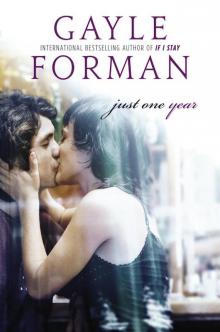 Just One Year
Just One Year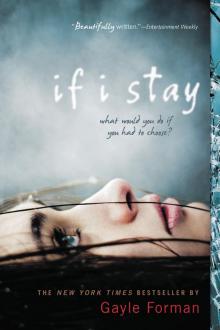 If I Stay
If I Stay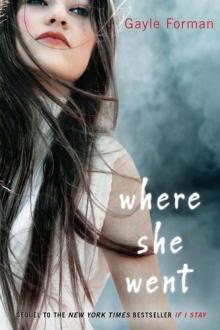 Where She Went
Where She Went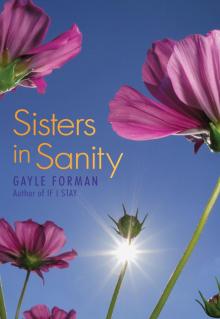 Sisters in Sanity
Sisters in Sanity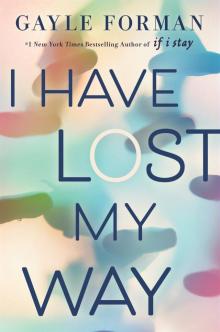 I Have Lost My Way
I Have Lost My Way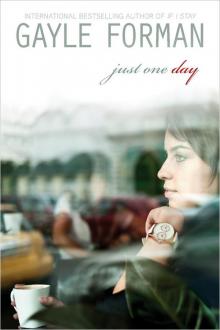 Just One Day
Just One Day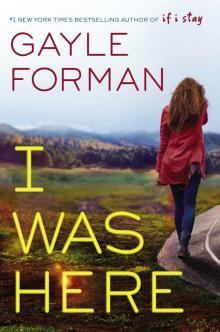 I Was Here
I Was Here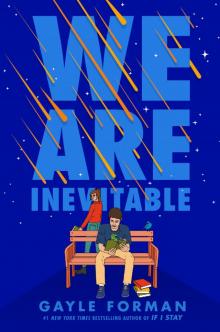 We Are Inevitable
We Are Inevitable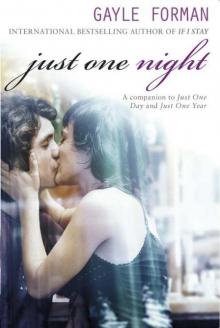 Just One Night
Just One Night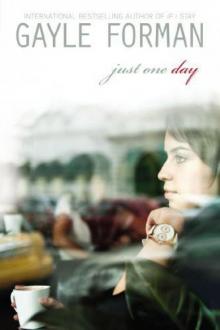 Just One Day jod-1
Just One Day jod-1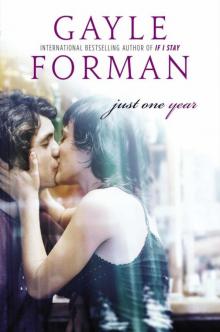 Just One Day 02: Just One Year
Just One Day 02: Just One Year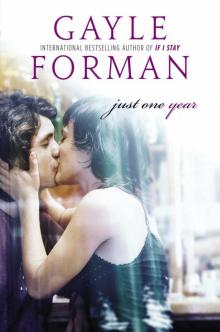 Just One Year jod-2
Just One Year jod-2